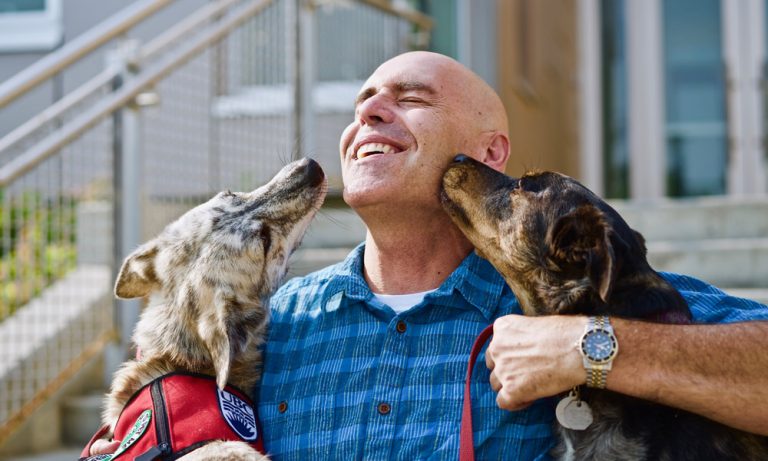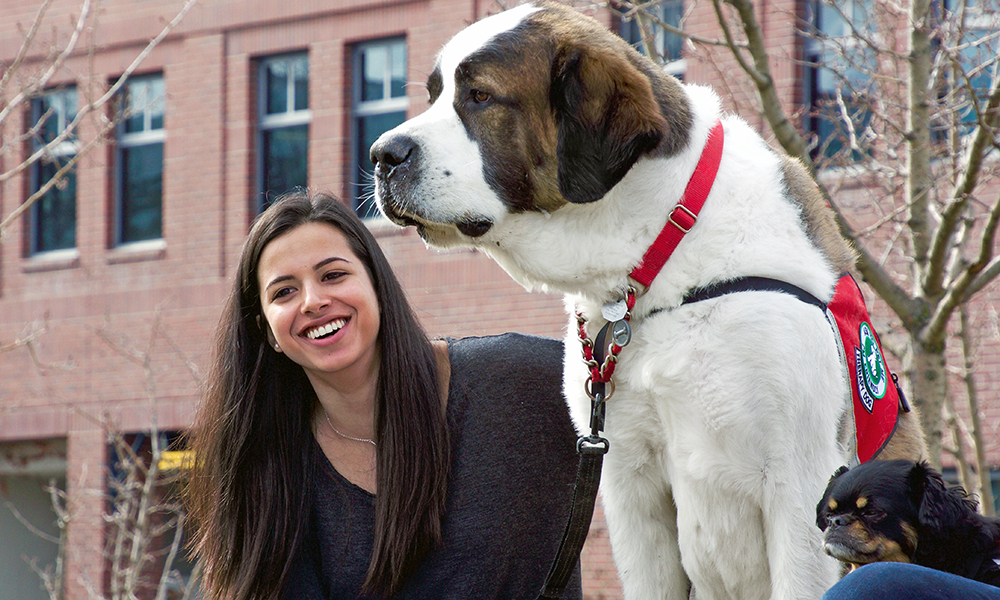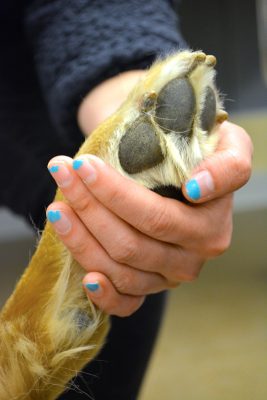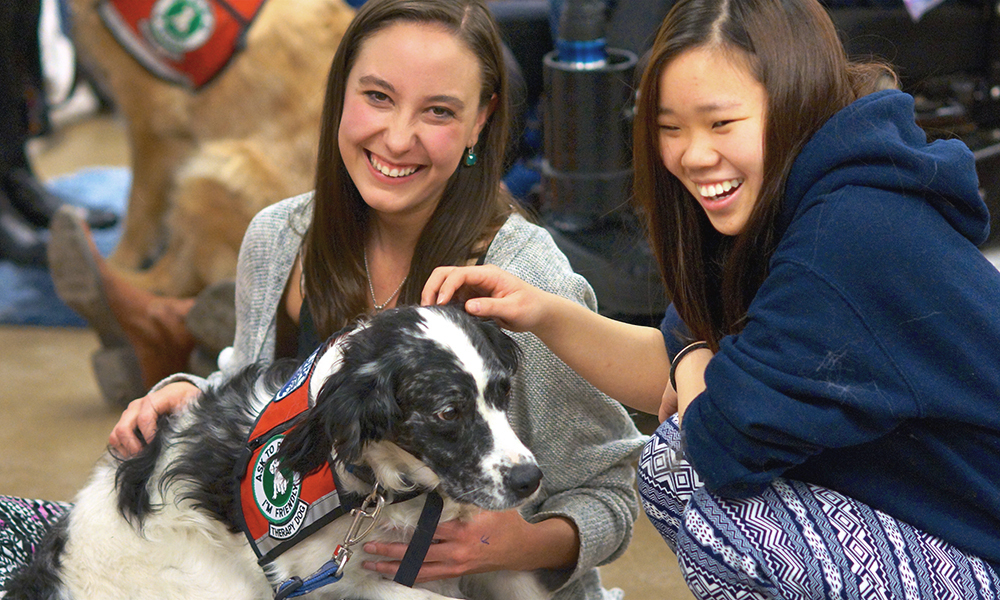
FRIENDLY CANINE COMRADES are at the heart of B.A.R.K.—Building Academic Retention through K9s—UBC Okanagan’s living, wagging Venn diagram of students, volunteers, mentors and other members of the community.
But while dogs are known to be especially intuitive and lovely beings with a knack for optimism and inner strength, they can’t read a lick. So, with no disrespect to dogs, this collection about the beloved canine therapy program is almost exclusively about people.
Ah, people—(hoomans!)—what with their formal educations, money matters and governments; their clock watching, lofty expectations and computations; phones, robots and other doodads…it can be a bit too much sometimes.
Like all people—albeit people far from home and family, or displaced in some other way—many university students often feel too much, and sometimes not enough. Then sometimes, they just want to cuddle a dog.
 That’s why John-Tyler Binfet, prolific researcher and assistant professor in the Faculty of Education, created UBC’s B.A.R.K. program for students in 2012.
That’s why John-Tyler Binfet, prolific researcher and assistant professor in the Faculty of Education, created UBC’s B.A.R.K. program for students in 2012.
When he started B.A.R.K., Binfet didn’t quite anticipate how the upstart program for student wellness would evolve into a model of fellowship with more than 50 therapy dogs.
“I can only take so much credit for the success of B.A.R.K. as it’s really the dogs who do the heavy lifting in the program—they connect with students in ways faculty, staff, and even peers can’t match.”
Over the course of six years, B.A.R.K.’s spirit of community outreach has moved its volunteers and trained dog handlers to pay it forward to other beneficiaries, including the broader campus community, students from the Boys and Girls Club and even law enforcement personnel at the local police precinct.
“I really look up to John-Tyler,” says student-researcher Haley Silas, a long-time B.A.R.K. volunteer. “He’s super-supportive—he’s ambitious for us. He sees our full potential and pushes us to succeed.”
Students. This—with a few guest appearances—is their perspective.
Blago Hristovski: Witnessing B.A.R.K.’s “social lubrication effect”
Alumnus Blago Hristovski has a good eye for photography, but maybe an even better eye for aerospace engineering.
The recent BASc grad from UBC Okanagan is now a Masters candidate at The University of Toronto, developing unmanned aerial systems for assisting in aerial wildfire operations, from detection to reconnaissance and containment.
Through B.A.R.K., after a fluke encounter in a parking lot with Binfet, he pursued his hobby of photography and diversified his volunteer experience.
Going to weekly drop-in sessions, Hristovski noticed the “social lubrication effect” that K9s can have on human interaction. “After one session, I was hooked.”
“I also felt like I became more a part of the campus community as a whole, not just the engineering program, and not just from an engineering point of view,” he explains.
“I couldn’t believe how much emotion was built up inside some of the students, whether it was happiness or excitement or sadness or loneliness. It was inspiring to be a part of all that energy, and it ultimately allowed me to develop interpersonal skills with both students and members of the community.”
Haley Silas: From homesickness to published research
The unofficial first rule of B.A.R.K. club is: Be present. Few rules apply, but just showing up is at the top of the list, followed closely by presence of mind: Keep calm and K9 on.
Bachelor of Science undergrad Haley Silas has been with B.A.R.K. for four years, almost since day one as a fresh transplant from Calgary. “In your first year, you’re in a new environment, away from home and also learning to live on your own. Homesickness is a big factor,” she says.
Without a lot of electives and balancing busy labs, tight schedules and long days, Silas went for canine comfort in the 90-minute Friday afternoon drop-in sessions. “In first year, you tend to be with people in the same program, not meeting many people outside your faculty. The great thing about B.A.R.K. is students are not all from the same program or faculty—that’s what builds the sense of community so much.”
“Students in the B.A.R.K. program are not all from the same program or faculty—that’s what builds the sense of community so much.”

BSc student Haley and Bernadette the St. Bernard (Photo by Blago Hristovski)
Silas says she’s met students from Singapore, China, Switzerland, “all over Europe, all over Asia, all over Africa… Because dogs are universal.”
As designed for first-year students, B.A.R.K. helped Silas quickly settle into the calming routine. Soon she was volunteering, as many students do, starting with the basics: set up, check in and clean up. In just her second year of studies, the aspiring veterinarian co-authored a publication about canine-assisted therapy for international students’ English-language development, and collected data in a directed study about how canine therapy improves social connectedness.
Now the Biology undergraduate is running her own research project through B.A.R.K., a triangulated study about behavioural stress in canines. Binfet is co-supervising her Honours thesis.
“The program,” she says, “is a bit of a research hub where everybody brings something different.”
Handling with Care: A mutually beneficial way of giving back
Ask Renee Leboe about the B.A.R.K. program and she immediately lights up.
“I love B.A.R.K.” she says. “My dog Koda brightens my day, every day, so I wanted to share his sweet personality and smiley face with students. Koda is a like a magnet for students.”
A student advisor in the School of Engineering, Leboe has volunteered as a dog handler with B.A.R.K. for several years.
“It’s a way to give back to the UBC community. Besides, who doesn’t love a furry friend?”
As both advisor and B.A.R.K. participant, she sees firsthand how some students struggle being away from home, and with school and personal stressors. “A lot of the students who attend also talk about missing their dog back home.”
One of those students was Aditya Chaudhuri, who recently graduated from UBCO with a degree in electrical engineering. He worked with Leboe organizing events as a Peer Mentor.
“I fondly remember Renee and Koda one morning, entering the building, when I was setting up a fair-trade pancake breakfast,” Chaudhuri says. “A nearby student looked incredibly stressed. Renee approached her and she immediately brightened up, petting Koda and just talking. The student’s smile stayed long after they left. It probably made her whole day.”
Before UBC Okanagan, Chaudhuri grew up in Calgary, then transferred to University of Alberta in Edmonton, where he worked closely with Sundance Canine Rescue Society. New to the School of Engineering, Chaudhuri was keen for more and found it in UBCO’s B.A.R.K. program.
“Students are stressed and need some sort of therapy, and rescue dogs, for example, need exposure, socialization and love to transition back into society from their disturbed pasts,” he says. “Bringing them together is mutually beneficial.”
He says the program let him not only “manage and cope with the stress of school, but also give me a sense of purpose.”
Students. Dogs. Bringing them together is mutually beneficial.
Gradually he became a volunteer photographer for B.A.R.K. Even after graduation, Chaudhuri says he stays in touch with B.A.R.K. friends on social media. “They send me photos and videos of their dogs, and I am all smiles watching them.”
He’s also proud of all the B.A.R.K. photos he’s shared—“and it warms my heart every time I see one.”
While actively involved with Engineers Without Borders Canada, and a career focused on the fields of radio frequency and microwave engineering, Chaudhuri still feels connected to UBCO’s B.A.R.K. program.
“It intimately reconnected me to my passion of working with dogs, took away my school stresses, all-the-while giving me a sense of purpose and well-being, and shaping my identity and sense of belonging to the university.”
Freya Green: A first-rate education in animal-assisted therapy
It didn’t take long for Freya Green—arriving from England to the newness of UBC’s Okanagan campus—to bump into John-Tyler Binfet and his dog Frances, a mixed-breed rescue from California. Within weeks she was a participant in the B.A.R.K. program, “thriving, feeling less homesick, less stressed, making new friends and spending my Friday afternoons with dogs. By the end of the semester, I was also a volunteer photographer.”
That was in 2013. Green now is pursuing her MA degree in Education, studying animal-assisted therapy under Binfet’s guidance.
Her evolution in this field includes an honour’s thesis examining social connectedness through canine therapy, running sessions at the VEDA student apartments just off campus and delivering B.A.R.K. sessions to children at the Okanagan Boys and Girls Club, where the pooches and volunteers help kids learn about introductions, meaningful compliments, speaking confidently, active listening and the importance of a solid handshake.
“B.A.R.K. provides students with the social and emotional support that may encourage them to continue their post-secondary education.”

Green is also helping to facilitate a program at the RCMP detachment in Kelowna, examining the effect of canines on the stress levels of law enforcement personnel.
Her B.A.R.K. highlight? “This will sound cheesy,” she says, “but it’s the people that make this program for me. It is genuinely a little family.”
Green says that acclimatization in the first academic year is considered crucial to retention and academic success. “Researchers have estimated that as many as 15 per cent of students who start university will not graduate in their lifetime, and that loneliness, isolation, and lack of social support are contributing factors in the decision to drop out.”
B.A.R.K. routinely sees more than 30 per cent of the student body make use of its programs, she says. “Dr. Binfet’s research demonstrates its value in increasing well-being—as reflected by a reduction in stress and homesickness and increased satisfaction with life—and providing support for the notion that canines may play a role in facilitating new friendships and connections.
“As such, programs like B.A.R.K. provide students with the social and emotional support that may encourage students to continue their post-secondary education.”
Carson McKay & Jordan Yandel: Success with simplicity
“Dogs are an excellent social catalyst,” says Carson McKay, another long-time B.A.R.K. volunteer. He graduated in 2016 (BSc Honours), then worked at the BC Cancer Agency before returning to pursue his Bachelor of Education at UBCO.
“I am loving it so far, he says, “and I really feel it’s the right path. Without B.A.R.K., I think I would have pursued something less inspiring, and maybe would have a much gloomier outlook on life.”
McKay sees B.A.R.K. as “a micro-community builder here on campus” that has allowed him to practice his teaching skills, such as with the Boys and Girls Club project where he helped with lesson planning and organizing the student volunteers.
“You don’t have to articulate how you feel. Dogs understand you in a way people don’t.”
The six-week program measured elementary school children’s sense of confidence and leadership pre- and post-sessions. There was a noticeable effect after each, says Jordan Yandel, B.A.R.K. volunteer and fourth-year psychology undergraduate.
The first week, she says, the kids were visibly nervous though well-behaved. They didn’t talk unless prompted. By the end of each session they were all more chatty. “You got bits and parts of their personalities and their home life, and some of them started to have fun going out into the foyer and introducing themselves to UBC students.”
It’s essential that kids like these—handpicked, needing “a little bit extra help and encouragement”—grow confidence at a young age.
“They’re going to grow up and go out into the real world,” Yandel says. “It’s really important to be able to handle yourself. Gaining confidence can only help foster who they become as people.”

Psychology student Jordan Yandel, left, in her new comfort zone (Photo by Blago Hristovski)
Yandel knows, she’s been there—her first year at UBCO wasn’t always a picnic.
“Being new, B.A.R.K. helped me get out of my comfort zone,” she says. “I felt I needed my friends to go with me and to stay with them, and by the end of my first year I was comfortable going alone. You get a sense of community and being able to talk to the handlers—non-student perspectives on things is really nice. And, of course, the dog part.
“People just get dogs; dogs just get people. You don’t have to articulate how you feel. Dogs understand you in a way people don’t.”
Let’s hear it for the dogs! Yandel describes why.
“Sometimes you’ll see kids come in and they just look weighted down—facial expressions are kind of blank, you can just see the stress and tiredness.
“Then, as they go through other stations, you see they start to smile and laugh, and by the time they leave they’re talkative and more relaxed. So at least for the 30 minutes or so that they’re around dogs and handlers—it really makes a difference, and it’s so simple.
“There’s candy, dogs, people. Simple.”
The Research behind B.A.R.K.
The focus of Binfet’s research covers two themes: Conceptualizations of Kindness in School, and the Effects of Animal-Assisted Therapy on Students’ Well-Being.











